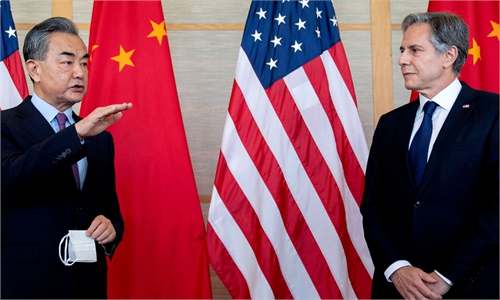US House hypes ‘China threat’ to boost military budget, shows sense of insecurity amid economic woes

The guided-missile destroyer USS Sampson sailed through the Taiwan Straits on April 26, 2022. Photo:VCG
The US House of Representatives on Thursday passed an annual defense policy bill for fiscal 2023, approving a $37 billion boost to the budget proposed by President Joe Biden in March. US lawmakers cited threats posed by Russia and China as well as inflation for the budget increase, which also contained several Taiwan-related bills with the aim of reinforcing relations between the US and Taiwan island.
The record defense budget for fiscal 2023 may end up with an even higher final figure, and the US military budget won't have far to go to exceed $1 trillion, Chinese analysts said. They believe that when the US feels economically insecure, it often tries to use force for the sake of seeking global hegemony, and the Taiwan-related part of the defense bill was an example of the US trying to use Taiwan island to contain China. But in fact, China is increasingly gaining an upper hand on the Taiwan question as well as China-US relations, and the US' sky-high budget will only end up in the pockets of arms dealers and make the US less secure, analysts said.
The defense policy bill passed by the House authorized nearly $840 billion in defense spending for fiscal 2023, and House lawmakers cited high inflation, the Russia-Ukraine conflict and "threats" posed by China to justify adding $37 billion, according to the Wall Street Journal.
Lü Xiang, a research fellow at the Chinese Academy of Social Sciences, told the Global Times on Friday that the final figure for military spending in fiscal 2023 is likely to be higher than the figure passed by the House.
The WSJ said lawmakers will work behind closed doors to reconcile both chambers' bills before sending compromise legislation to the president's desk for his signature.
Lü said the Biden administration still regards pushing for global hegemony with force as its top priority even when the US economy is in a very perilous state. The more economically insecure the US is, the more it wants to seek to meet security needs, but it cannot achieve absolute security even with sky-high military spending, he said.
Song Zhongping, a Chinese military expert and TV commentator, told the Global Times on Friday that sooner or later the US military budget will exceed $1 trillion, as the US will continue to raise its military spending to satisfy its military and global hegemonic ambitions.
Analysts said the US is sick, as it still feels insecure even when its military spending is equivalent to that of more than 100 countries.
According to Taiwan media reports, the defense bill passed by the House contains the "Taiwan Peace and Stability Act," which focuses on enhancing deterrence measures in the Taiwan Straits, and the "Taiwan Fellowship Act," which will give US policymakers the opportunity to live and work in Taiwan island. The bill would also support the Biden administration to invite Taiwan to join the Rim of the Pacific Exercise in 2024.
Democratic Representative from California Ami Bera, who co-introduced the Taiwan Peace and Stability Act, said it signaled a path forward on US policy toward Taiwan and drove a government review of options to "enhance deterrence over a cross-Strait conflict," according to a press release on Bera's website.
Lü said it's not mandatory for Biden to approve and implement the defense bill, and he doubted how much of it will actually be implemented.
Song said that even if the US did invite Taiwan authorities for the 2024 military exercise, Taiwan would not play any significant part due to its weak military strength.
Taiwan representatives would only be able to watch and have little practice during the exercise, as they cannot keep up with the US navy and its allies, Song said.
After all, allowing the Taiwan authorities to participate was more about selling the island obsolete weapons made by the US, Song said.
He believed the Taiwan Peace and Stability Act actually undermines peace and stability across the Taiwan Straits, and is an evil act.
Lü said the US defense bill is testing China's resolve on reunification.
"China is increasingly gaining the upper hand over the Taiwan question and relations with the US," Lü said, listing the meeting between Chinese State Councilor and Foreign Minister Wang Yi and US Secretary of State Antony Blinken in Bali as an example, during which Wang pointed out that the China-US three joint communiqués are the real "guardrails" for bilateral relations.
China later described the meeting as "constructive," and Chinese observers noted the US may have also provided some positive indications during the talks.
According zaobao.com based in Singapore, Li Mingjiang, associate professor at the S. Rajaratnam School of International Studies in Singapore, said in commenting on the meeting that in the past, the US has always made demands of China. But this time, China has put the ball in the US court and showed that China is trying to seize the initiative in shaping China-US relations.


